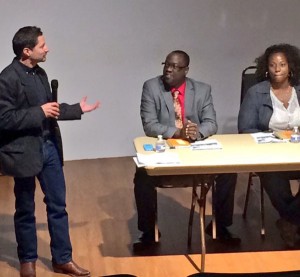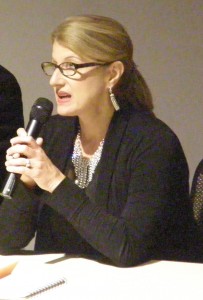Local educators, UM-Flint faculty and staff, students and community members met at the Kiva Theater Oct. 22 to view an award-winning documentary film, Most Likely to Succeed, and to consider innovations in teaching and learning that a San Diego high school has implemented.
The film gave viewers a close-up look at High Tech High, a charter school where students and teachers approach the learning process in an alternative yet highly engaged style, and with mixed results. It’s done with an eye on preparing students to master the complex skills required to meet today’s vast and quickly-changing technological advances. Measures of learning happen absent the memorization of volumes of material or in preparation for state-standardized tests.
The film opened with an overview of the relatively static history of today’s education system, noting few substantial changes in the system since the Industrial Age despite lightning-speed advances in technology and science-based fields that continue to evolve. It presented the view that our education system has not met those advances adequately, leaving college graduates scrambling to find work in their field or employed in low-paying jobs that don’t require a college degree.
At High Tech High, subjects are combined in collaborative settings, there are no set class periods, and teachers secure one-year contracts in exchange for having the autonomy to teach however they want to teach. Students learn by tackling difficult projects and applying “soft” skills that are valuable in today’s job market but tend to be less emphasized in traditional classrooms: collaboration, a strong work ethic, creative thinking combined with critical thinking, self-confidence, perseverance and time management.
Learning at High Tech High culminates with a public exhibition of student projects that receive critical evaluations by local community citizens. Though the curriculum is less content-driven compared with traditional schools, 98% of graduates from this school are accepted to college. A panel discussion moderated by education associate professor Jeff Kupperman followed the screening.
“I think we need to think about whether we are interested in our students gaining content knowledge or applying content knowledge,” said panelist Bob Barnett, Dean of UM-Flint School of Education and Human Services. “The documentary looks at how you can manipulate the education system to fit it into the culture.” Tying content knowledge to experiential learning is happening in Genesee County, he noted.
Others on the panel included Lori Anthony, teacher at Swartz Creek High School; Adam Hartley, Executive Director of GEARup2LEAD with student Jashanna Ishmel; Ron Madison, instructional technologist & designer with Genesee ISD; and Kenya Williams, UM-Flint alumna and teacher at Beecher High School.
“This film is awesome because it shows different ways of how students learn,” said Ishmel, explaining that she learns better with less traditional approaches.
Panelists and attendees discussed how it’s possible for today’s teachers to tweak their classrooms to apply some of the innovative strategies addressed in the film, such as seminar-like approaches to class discussions and other student-led projects. Anthony said she tried the seminar approach in her classroom at Swartz Creek, where students ran a discussion on mythology. The seminar was loud and chaotic but it worked and students learned the material, she said.
Williams discussed the importance of assigning homework to build her students’ confidence at Beecher. “It builds confidence through teaching independent thinking,”she said.
Some attendees talked idealistically about radically restructuring the current education system in America and starting over. Panelists identified funding as something that needs to change systematically. Limited instructional time in the classroom related to preparing students for exams and standardized tests was discussed as another obstacle to implementing more creative teaching and learning methods. The general consensus was that applied learning needed to continue to be a high priority for Flint-area schools as well as districts across the country.
The event was sponsored by UM-Flint SEHS Dean’s Office and the Institute for Innovation in Education.


